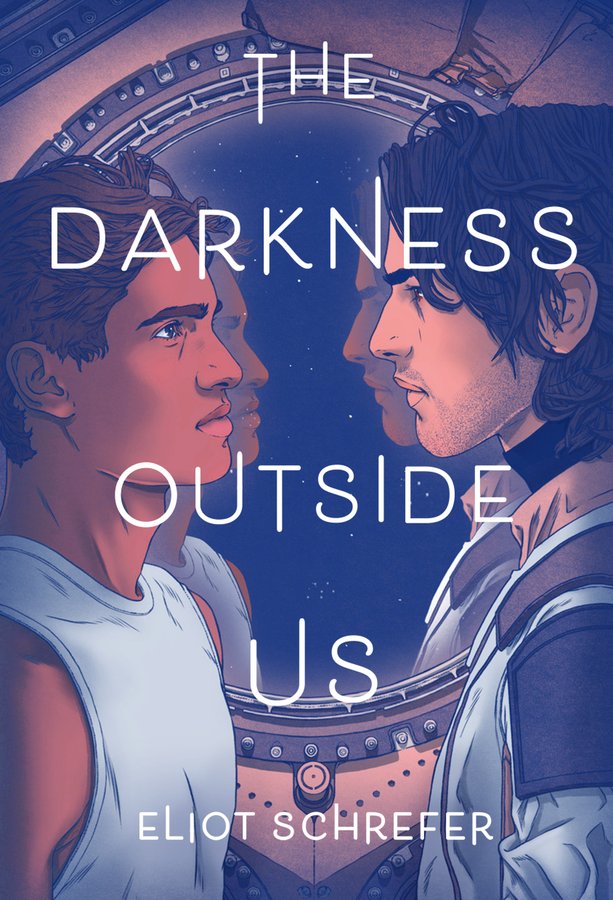The Darkness Outside Us
anagan/dp/1927917409/ref=sr_1_1?dchild=1&keywords=degrees+of+barley+lick&qid=1622417483&s=books&sr=1-1">

Author: Eliot Schrefer
Publisher: Katherine Tegen Books
After the first settler on Titan trips her distress signal, neither remaining country on Earth can afford to scramble a rescue of its own, and so two sworn enemies are installed in the same spaceship.
Ambrose wakes up on the Coordinated Endeavor, with no memory of a launch. There’s more that doesn’t add up: Evidence indicates strangers have been on board, the ship’s operating system is voiced by his mother, and his handsome, brooding shipmate has barricaded himself away. But nothing will stop Ambrose from making his mission succeed -- not when he’s rescuing his own sister.
In order to survive the ship’s secrets, Ambrose and Kodiak will need to work together and learn to trust one another… especially once they discover what they are truly up against. Love might be the only way to survive.
left no-repeat;left top;; autoI love a good sci-fi thriller/chiller and Eliot Schrefer has done a tremendously awesome job of using words to give the reader a view through the eyes of the characters. The story is futuristic in nature and gives a glimpse of universal life in the distant future, where robots and operating systems are programmed to be guardians.
Love is a very strong theme throughout the story, as is evidenced by Ambrose’s desire to locate his sister Minerva -- who has disappeared without a trace. Even when the odds are stacked against him, he is determined to rescue her from the far-flung planet of Titan, where it is presumed her distress signal emerged. It is also love at first sight for the flirtatious Cusk, when he first lays eyes on the sleek Dimokratian. Celsius is initially oblivious to his trivial attempts, but eventually caves as loneliness fueled by the constant advances of the evidently “spoiled Federation brat” causes him to succumb.
Loneliness is also very prominent. That is something Ambrose is not equipped to deal with as he was always surrounded by family, friends or admirers back on his home planet. This theme sends a strong message to us of the need for “human” companionship and interaction, and Ambrose is quite ecstatic when he discovers there’s another “human” on board.
His excitement, however, is not readily shared by the egotistical Kodiak Celius, who makes no effort to hide how he truly feels about someone he sees as a nuisance and irrelevant personnel/enemy of the state.
A level of maturity is noted when both make the decision to put aside their differences (incited by indoctrination from their respective nations) and work as a team to complete the mission. Kodiak takes on tasks assigned to the immature Ambrose, who is more focused on satisfying his sexual urges and constantly daydreams of frolicking on sun-drenched beaches. They do make a formidable team: Ambrose has the brains and Kodiak the brawn. This is clearly seen when they unite to solve the mystery of the blood/hair/flesh combination sample and the big space secret.
Throughout the story, readers, as well as characters, are constantly assaulted with a barrage of questions:
What is the exact location of the spacefarers?
Are the events in the story real?
Is Ambrose imagining things?
Has space travel distorted their reality or is it déjà vu?
What exactly are Rover and OS up to?
Who’s really in charge -- humans or technology?
Have they passed through a wormhole/time warp?
Is this an experiment to observe human behavior in isolated space travel?
Are the space travellers clones?
Has their ship been hijacked by aliens?
In the end we realize the suitability of the book’s title, as the story has both a literal and a figurative meaning. “The darkness outside us” refers not only to the dark abyss of space (physical environment), but also the mental and emotional trauma experienced (the uncertainty of their future). Is the darkness mental? depression? or psychosis?
The reader is left to ponder if this story is indicative of what the future holds. Advances in technology are light years ahead of human comprehension, but also highlight that man’s dependence on operating systems (OS) will always prove detrimental -- it is futile to think we can ever fully control them.
OS vs clones is a war of technological wits and proof that both are uncontrollable and actually have a “mind of their own” -- pun intended. OS who was once the “enemy” later becomes the “ally” as the weary travellers fight for survival.
Overall, the book may be viewed as a journal documenting info for their future selves. Earth and humans are destroyed and the hope of future generations is dependent on the survival of just two people. What will happen next?
- Nickcoral Somerville
left no-repeat;left top;; auto
